- Home
- Lee Martin
The Mutual UFO Network Page 2
The Mutual UFO Network Read online
Page 2
“Do you have any plane crash stories?” I said to the British man.
“Wouldn’t sell many of those, now would I?” he said. Then he slung his duffle bag over his shoulder and moved to another gate.
The nail-biter lifted his hand from the woman’s head, and I could see his fingerprints, their red smudges, rimming the front of her skull. She opened her eyes even wider and bunched up the skin on her forehead as if she wanted something to click back into place. The nail-biter put his hands on his knees and leaned forward. “You said that on purpose, didn’t you, Chicken Little? That stuff about plane crashes. You wanted it to get under my skin.”
“Pardon?” I said. “Are you talking to me?”
“That’s right, chickee. You hear anyone else squawking about the sky falling?”
The nail-biter’s long fingers were trembling, skittering about on his knees. The woman reached over and put her hands on top of those trembling fingers, pressing down to hold them still. “Jinx,” she said. “Don’t.”
Jinx, the nail-biter, moved his left hand out from under the woman’s. He held it up between them. “It’s all right, Yum-Yum. Everything’s square.” He patted the empty seat beside him. “Come over here, chickee,” he said to me. His chin was trembling now, breaking up into goose flesh around his sad whiskers. “I want to tell you something.”
Suddenly, he seemed like such an easy mark, and I was ashamed of how I’d spooked him. I’d known exactly what to say, and now there he was, looking like he might cry. That was the last thing I needed to see because then I’d start thinking about my father, on his knees in his garden, putting the pea vine I’d ripped free back in the ground, pulling soil up around it with his hands, hoping its roots would take hold. If I looked at that picture too long—if I saw my father’s faith—I knew I might never get on my plane.
“Here’s a true story,” Jinx said to me when I was finally sitting beside him. “I’m scared.”
His honesty won me. “The plane?” I asked.
“He thinks it’s going to crash,” Yum-Yum said.
“They rarely do,” I told him.
“I know.” He nodded. “But when they do…oh, doctor.” Yum-Yum was patting his knee. “Have you taken the ginger yet?” “No, I haven’t done that.”
“Ginger capsules,” she explained to me. “For air sickness. They’re a natural alternative to Dramamine.”
“I’ll go find a water fountain.” Jinx looked behind him, up and down the concourse. “That’s what I’ll do.”
While he was gone, I remembered how, when I was a kid, my parents and I drove from Texas to Virginia every summer to see my grandparents—my mother’s folks, who owned a farm in the Shenandoah Valley. In East Tennessee, the climb and drop of the mountains made me car sick, and I had to sit in the front seat with my father. He called me The Navigator. “Mister Navigator,” he always said, “you’re riding shotgun. It’s up to you to keep us on track.”
My mother took my place in the backseat, and soon she dozed off, and my father said, “She’s out like a light. Now it’s just you and me.”
I always wondered whether she resented my delicate sense of balance—the simple act of moving through space left me dizzy—and the way it exiled her to the backseat. But when we came down from the mountains into the lush valley, she reached over the seat, put her arms around my neck, and gave me a hug. “Nate,” she said once, “your mother’s a fool. Tell me. Why did I ever leave something so green?”
“Maybe I had something to do with it,” my father said.
“Yes,” my mother told him in a flat voice. “For better or worse, you did.”
Outside the terminal, the rain was slicking the tarmac. Though it was early afternoon, the landing strip lights were distinct. Way off, on the other side of a chain-link fence, two longhorn cows huddled together beneath a mesquite tree.
“His first time?” I said to Yum-Yum.
She got down on her knees and began picking up the bits of fingernails Jinx had spit onto the carpet. She held them in her palm. “We wouldn’t go if we didn’t have to,” she said, and it was as if she wanted to apologize for their presence and the way our lives had intersected.
“Emergency?” I said.
She moved to a trash can so she could get rid of the fingernails. “That’s another story,” she said.
At that moment, there was a commotion behind us. It was two security guards, their two-way radios squawking. They held the British bookseller; each had a good grip up in one of his armpits, jerking him up onto the balls of his feet, crinkling the leather of his new loafers. His polo shirt had jerked free from his trousers. The roll of flesh around his waist was very white.
“I don’t care if you’ve got the Ten Commandments on Moses’s tablets,” one of the guards said. He was a man with a gray moustache and pink bulbs for cheeks. “You can’t sell them here.”
What were the truest words I knew? That’s what I wondered then. What could I say if I ever came to a moment where the rest of life depended on what I said?
“Yum-Yum.” She turned, startled to hear me use her nickname. The lid of the trash container slammed shut. “I’ll take you wherever you want to go,” I said. “Right now. You and me. Before Jinx comes back.”
She scraped the fingers of one hand across the palm of the other as if Jinx’s nail clippings had worked their way under her skin like splinters and she couldn’t get them out.
“Your flight,” she said.
“We could leave,” I told her. “I know that’s what you want to do.”
The British bookseller was still putting up a fuss. “The truth, I tell you, gents. All true. This whole bloody life.”
“You think it’s easy,” Yum-Yum said to me. Her fingers were curled down now, and I imagined her nails digging into her palm.
My mother had done it. She’d walked away. “You find your chance,” I told Yum-Yum, “and you take it.”
She turned and looked out over the tarmac, through the rain, to the horizon. A jet was touching down on the runway; another was climbing. She tipped back her head and watched the plane until it slipped into the cloud cover and vanished.
I heard a woman saying my name over the PA system, and it felt so strange to hear it, then, at the moment when Yum-Yum and I were in the midst of spinning a secret plan.
“That’s me,” I said.
“See?” She lifted her slight shoulders and let them fall with a sigh. “There are ways. He’d find me. He always does.”
It was my father calling. I picked up the courtesy phone and heard him say my name. “Nate,” he said, “what are you doing?”
“I was talking to a woman.” I could see Jinx, back from the water fountain, looking at the spot where his fingernail clippings had been. “She’s with this guy. I think he’s mean to her.”
Jinx kicked at the carpet with the toe of his boot. “Do I embarrass you?” he said to Yum-Yum, who was sitting down now, her hands folded in her lap.
“I was never mean to your mother,” my father said. I could hear the whir of his computer in the background, the sleek glide of tape through his editing machine. “You know that, don’t you, Nate?”
Jinx had his hand on Yum-Yum’s head again, but this time he was rubbing it, letting his fingers brush the velvet of her hair, and, finally, she leaned into him and closed her eyes.
“No,” I told my father. “I don’t think you were mean. Not on purpose.”
“What was it, then?” I could hear him running the tape backward and forward through the editing machine. “What made her leave? UFOs? What’s that to make a life together go kaput?”
The security guards were dragging the British bookseller away. They had handcuffs on him, and he wasn’t talking now. One of the guards carried the duffle bag full of books. All those stories. All those people’s lives.
Since then, I’ve wondered, if I’d told my father the truth—if I’d said to him, “You made everything matter a little less”—whether things would h
ave worked out other than the way they did. He’d created too much possibility. He’d made the world so enormous, all my mother and I could do was fall into its space like the blips of light he threw upon a screen. There. There. And then they were gone.
“It was me,” I said. “I got caught looking in windows, and everything went wrong after that. No one but Mr. Laskey would talk to us. What kind of life did we have?”
I lied because I remembered how I felt when I’d gone to our neighbors’ doors and told them I’d watched them when they’d thought themselves hidden away in their homes. No matter how kind I was, how sorry, I knew they were all thinking back, reliving the nights of that winter. How could they help but catalog everything they’d done and wonder whether I’d seen their worst moments, the moments of anger, gossip, appetite, despair. No matter how I assured them, I knew they’d start to feel guilty about the way they’d lived, and this, for better or worse, was what I couldn’t do to my father.
The only neighbor who hadn’t felt exposed had been Mr. Laskey. “Nathan,” he’d said to me. “All those nights. So cold out there. Please. Why didn’t you just come in?”
All the others shrank away from me, my last glimpse of them a face in the vanishing strip of light as a door closed. “Oh, you boy,” Mrs. Poe had said. “You wretched boy.”
Jinx and Yum-Yum were huddled together. The rain was coming hard now, and everything outside—the tarmac and the planes, the baggage handlers in their orange slickers, the sky itself—wavered and blurred.
“It’s not so bad getting caught,” my father said. “It can be a start.” He took a breath and then let it out. “I did time once. Even your mother doesn’t know this. I had this racket going, a little bait-and-switch routine.”
His confession, which I believed he meant to make me feel better, less alone, only made me think of myself as more criminal. “Is that what you called to tell me?” I said.
“No, I wanted to tell you I got that pea vine back in the ground. I thought you’d want to know that.” For a good while, neither of us said anything. Then he said, “Don’t feel sorry for your old man. It wasn’t so bad in prison, not in this minimum security joint. It was waiting, mostly, and I had a job, a way to pass the time.” He made Braille maps, the raised lines meant to be traced with fingertips. “I did the New York City Subway System,” he said. “Disneyland, Yellowstone, the Grand Canyon, the Loop in Chicago.”
He went on listing the maps he’d done, and I closed my eyes and followed his chant. I imagined all the places in the world where a person could try to hide. I memorized my father’s voice, told myself I’d always remember it.
“All those maps,” he said, his words a whisper now, distant and faint. “All those places I couldn’t go. Jesus, Nate. All those people who couldn’t see.”
ACROSS THE STREET
THE IDEA WAS TO LET THEIR ADULT SON LIVE ON HIS OWN. AFTER YEARS of group homes and institutions and finally time spent in their care, his parents—he an inventor, and she a dour, nervous woman—purchased a two-story house on Bay Meadows Court and helped their son move into a subdivision just inside the outer belt with its constant noise of traffic. They lived in one of the city’s high-toned suburbs nearly ten miles to the east, a village of stone houses and stone walls and a fall festival on the green, a ritual they had to bypass this year because they were busy with the house that would now be their son’s. It was time, the father assured his wife, to let whatever was going to happen run its course.
“He’ll be aces,” the father said. “Not to worry. He’ll be tip-top.”
Said the mother, “I’m beyond worry. I mean it. I wash my hands.”
The son’s name was Jim, a solid name, a name one might expect a fifty-eight-year-old man to have, coming as he did from a generation of Jims and Eds and Bobs and Joes and Steves—good, solid names for good, solid men.
But this Jim, as the neighbors would soon discover, was wobbly. He was, as the neighbors would finally say to each other, “peculiar.”
“An odd bird,” said Artie Manks. Artie owned a wholesale jewelry business, and his stubby fingers were heavy with rings—gold bands, some with onyx stones—and a Rolex of Everose gold nestled into a tuft of gray hairs on his left wrist. He drove a red MX-5 Miata with a retractable hardtop and was known to come speeding down the cul-de-sac in the evenings with a toot-toot of his horn to let his wife, Glory, know he was home.
Glory worked for a company that sold self-defense products to women. She organized home parties and convinced women to buy pepper sprays, steel batons, throwing stars, kubotans, door braces, and even complete home security systems. Whatever it takes, she told her clientele, to keep you safe. She’d perfected a delivery that made women feel simultaneously afraid and confident. She dressed in business suits, wore sensible shoes, kept her dyed black hair in an upsweep, wore a single strand of elegant pearls around her neck.
At home, though—ah, at home, she was a different gal: relaxed, carefree, on the lookout for the next laugh. She drank Knob Creek bourbon—in moderation, of course—even smoked a little weed from time to time. She was of a generation bred in a time of excess, and she’d never quite got with the program that said she should be a lady of restraint as she aged.
“Artie, you’re a card,” she was heard to say on more than one occasion. She’d tip back her head and laugh, and the light would make the rhinestones in the frames of her cat-eye glasses sparkle. “You’re a cut-up,” she’d say. “A scandal.” Then she’d swat him across the arm and give him a stern look of disapproval that everyone knew was anything but—was, in fact, unmitigated adoration. “Oh, Artie,” she’d say. “You kill me. You really do.”
Glory and Artie lived directly across the street from Jim, and it was Glory, that autumn, who finally realized that each Monday, when the green trash Toters were lined up at the ends of driveways up and down the cul-de-sac, no such Toter ever made an appearance at the end of Jim’s.
“What do you imagine he does with his trash?” she asked her friend Tippy Duncan, who lived next door. Tippy was a stylist at a salon called Mop. She did Glory’s hair and was even kind enough to open the shop during off hours if Glory happened to need a cut or her dye job touched up before a home party. In exchange for her kindness, Glory sometimes gave her free samples of pepper spray, which Tippy accepted with some reluctance. “Golly, I wouldn’t know how to use it,” she said, “and besides, with Bart around, I always feel super safe.” She was the sort of gal who said things like “golly” and “super.” She wore cardigan sweaters and corduroy pants from L.L.Bean, and Glory had noticed she had a Jesus fish on the back of her Jeep. A mousy sort who needed more meat on her bones and more gravel in her gut. An easy mark—slight of frame, nearsighted because she refused to wear her glasses and contacts made her squeamish, slope-shouldered, always walking around with her head down. Just the kind of gal who needed to learn how to protect herself.
A sweet gal, though, with a sweet face and fair skin and lustrous brown hair worn in a pageboy cut. She was cute, Glory supposed. Cute and wholesome and appealing in that L.L.Bean sort of way.
Maybe that’s what Bart had fallen for, the placid predictability of a faithful and dependable girl.
Bart was a personal trainer at AussieFit, but his real love, Tippy said, was astronomy. Instead of putting people through their paces, he’d much rather be training his telescope on the heavens. “He’s a sensitive soul, Glory,” Tippy said. “People have no idea.” His special interest was optical astronomy, she said, the study of light, but by that point Glory had stopped listening.
“What about the trash?” she asked Tippy again. “It has to go somewhere, right? I tell you, that man is odd.”
“Maybe he’s just troubled,” Tippy said. “Maybe it’s like that.”
Then one Saturday afternoon in early November, Artie was outside using a leaf blower. He was humming a tune, “Fly Me to the Moon,” and he was a million miles away, taking smug pleasure in the perfect nature of his life—
a flourishing business, a house he owned free and clear, a wife who was nuts over him. Not a care in the world. Then he felt the tap on his shoulder, and when he turned around he saw Jim mere inches away, his finger about to jab Artie in the center of his chest.
Jim wasn’t an imposing man. He was slender and tall with long arms and a narrow face shaded by the bill of a Titleist golf cap. He had a shaggy brown moustache and he wore glasses. A sidepiece had broken off the frames, and he’d fashioned a substitute out of duct tape. A man who looked a little on the down side, but certainly not a man that Artie would fear.
Still, Artie couldn’t help but take a few steps back and feel his heart come up into his throat.
“What the hell?” he said.
Jim ran his finger across his own throat and then pointed to the leaf blower. Artie understood that he wanted him to turn it off, which he did.
“My mother is trying to make a call.” Jim gestured with his thumb, and Artie, following the invisible line it made behind Jim’s ear, saw the mother sitting on the porch, a cell phone to one ear, her finger stuck into the other. “She’s trying to have a very important call,” Jim said, “and here you are making noise with your rather large instrument.”
Artie didn’t like Jim’s tone, which made him feel that he was a schoolboy in Dutch with a teacher or his father.
“It’s a cell phone,” Artie said. “She can go anywhere. She can go in your house, for Christ’s sake. I’ve got nothing to do with any of that.”
Artie started the leaf blower again and even had the nerve to point it at Jim, revving the engine.
“You hadn’t ought to have done that, mister,” Jim shouted. “I’m your neighbor.”
“That’s what he said to me,” Artie told Glory when he finally put the leaf blower away and went into the house. “Who the fuck does he think he is?”

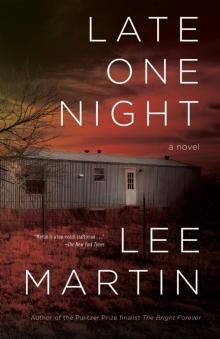 Late One Night
Late One Night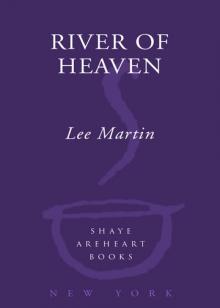 River of Heaven
River of Heaven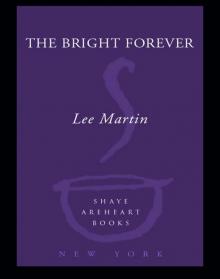 The Bright Forever
The Bright Forever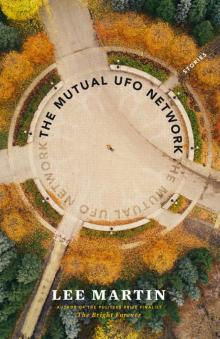 The Mutual UFO Network
The Mutual UFO Network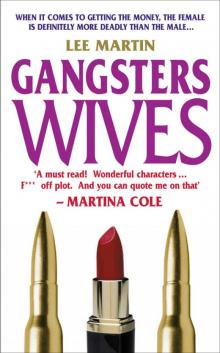 Gangsters Wives
Gangsters Wives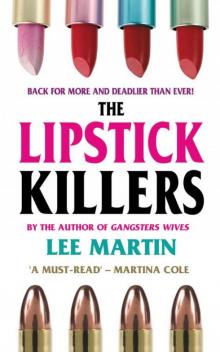 The Lipstick Killers
The Lipstick Killers